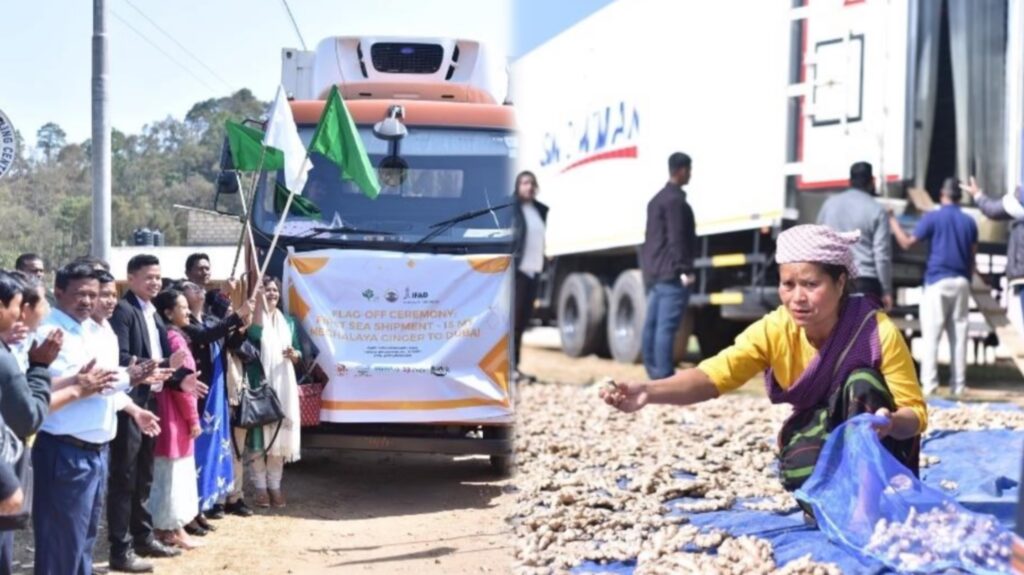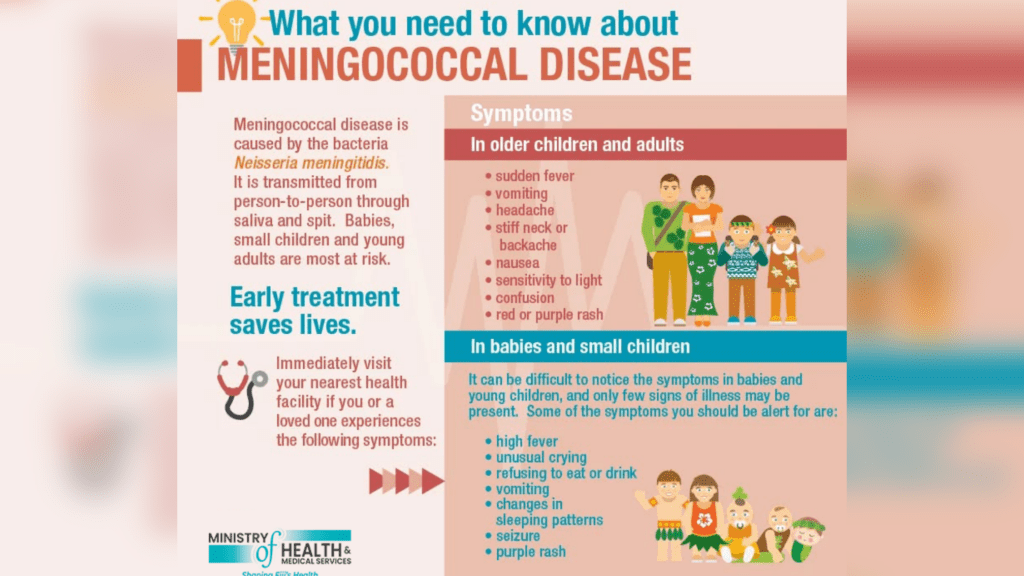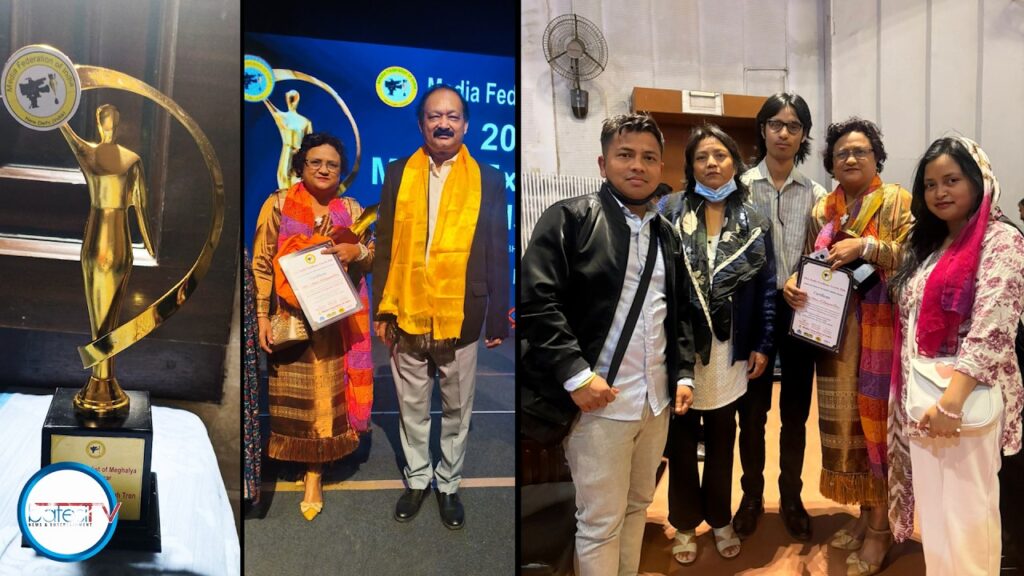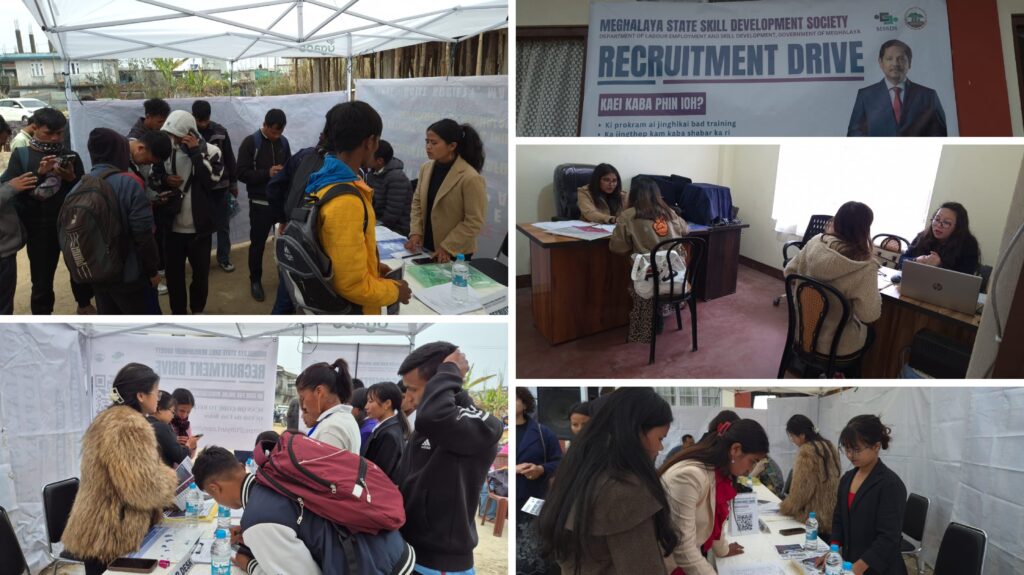Shillong, February 25 : The Department of Agriculture and Farmers Welfare, Government of Meghalaya, has marked a historic milestone with the first-ever sea shipment of 15 MT of Meghalaya Ginger to Dubai’s Lulu Group in collaboration with Agricultural and Processed Food Products Export Development Authority (APEDA). This achievement, facilitated by the Eastern Ri-Bhoi Organic Farmer Producer Company (FPC), reinforces Meghalaya’s commitment to enhancing its agricultural exports and integrating its farmers into global value chains. The consignment was flagged off in a ceremonial event attended by esteemed dignitaries from APEDA, Ministry of Economic Affairs and IFAD marking a new chapter in the state’s efforts to promote organic and high-value agricultural produce internationally.
Meghalaya’s agricultural sector has long faced unique challenges, including fragmented landholding, limited credit access, and working capital constraints for FPOs. One of the biggest hurdles has been the collection, aggregation, and adoption of a collective marketing approach. Farmers often struggle with inconsistent market linkages, leading to suppressed prices and heavy reliance on intermediaries.
However, through strategic government interventions, cooperatives have successfully aggregated and marketed ginger collectively, demonstrating that farmer-led initiatives can drive scalable and sustainable growth.
The Eastern Ri-Bhoi Organic FPC, established in 2017 under the Mission Organic Value Chain Development for the North Eastern Region (MOVCD-NER), has played a pioneering role in facilitating this export. The FPC, which began with limited infrastructure, has now expanded its operations significantly, processing ginger with modernized washing, slicing, drying, and packaging facilities. Today, the FPC supports over 500 member farmers from 9 villages, ensuring better price realization and market access. Over theyears, this collective has increased its revenue from ₹17 lakh in 2018-19 to ₹374 lakh in 2023-24, illustrating the immense potential of farmer-led enterprises when given the right support.
The flag-off ceremony, held in Shillong, was attended by key dignitaries, including:
Abhishek Dev, IAS, Chairman, APEDA, underscored the significance of sea shipment in making Indian agri-exports competitive. “Sea shipment is crucial as it ensures cost competitiveness. We have developed a dedicated sea protocol, and I am hopeful that with close coordination among stakeholders, our shipments will be well received in the UAE market.” Reflecting on Gulf Food 2024, he added, “There is immense excitement for Indian products, and we have been invited as the partner country for the next edition. I urge stakeholders to plan early participation in Gulf Food 2026 (January 26-30) and prominently showcase Indian ginger.” Highlighting the potential of organic exports, he noted, “The organic tag ensures a 30-40% higher price realization. APEDA is fully committed to supporting stakeholders in organic certification, and with Meghalaya’s own certification body, this process will now be easier.” On ginger exports, he affirmed, “This is not a one-off event. We will see more such flag-offs in the future as we continue expanding India’s agri-export footprint.”
Abdelkarim Sma, Country Director, IFAD, who highlighted the significance of farmer-led cooperatives in creating sustainable livelihoods. He stated, “The farmers are the owners of the cooperatives, and these cooperatives provide them security and hope for the future. I and the whole team of IFAD are proud to be part of this success. I look forward to hearing from the members about their journey so far and, most importantly, understanding what they envision for the cooperative’s future.”
Revistar Kharumnuid, Chief Executive Director, Eastern Ri-Bhoi Organic Farmer Producer Company, who welcomed the dignitaries and acknowledged the collective efforts that led to this milestone. He expressed his gratitude to the farmers, government agencies, and export facilitators for their unwavering support.• Smt. B. Mylliem Umlong, Director of Horticulture, who extended the vote of thanks, reiterating the government’s continued commitment to strengthening Meghalaya’s agricultural sector.
This achievement is a testament to the dedication of Meghalaya’s farmers, the unwavering efforts of the Department, and the collective commitment to strengthening the state’s agricultural exports. Recognizing the need for enhanced processing capacity, the state government is developing one of North East India’s first organically certified spice processing units in Bhoirymbong, Ri-Bhoi District. This ₹21 crore investment, with funding support from IFAD, will significantly bolster the capacity of FPOs, ensuring that high-value spices like ginger, turmeric, black pepper, and chili meet international standards.
The upcoming facility is designed to:
• Process 10,346 MT of spices annually.
• Provide 50 MT cold storage and 300 MT dry storage capacity.
• Utilize solar-powered technology for sustainable processing.
• Directly benefit 5,500 organic farmers, ensuring premium market access and reduced post-harvest losses.
• Establish direct linkages with national and international buyers to ensure better price realization for farmers.
The first sea shipment of Meghalaya Ginger to Dubai highlights not just the state’s export potential but also the effectiveness of community-driven development and strategic partnerships. Continued support from Agricultural and Processed Food Products Export Development Authority (APEDA) has been instrumental in trial marketing various commodities from Meghalaya, including GI-tagged Khasi Mandarin, organic pineapple, and now ginger. APEDA’s involvement in previous export consignments has provided crucial insights and facilitated market access, further enabling this successful international shipment.With government initiatives focusing on infrastructure development, farmer training programs, and market access facilitation, Meghalaya is strengthening its agricultural ecosystem for long-term sustainability. As the state continues to expand its global presence, such initiatives will ensure better remuneration for farmers, enhanced value addition, and economic growth.








